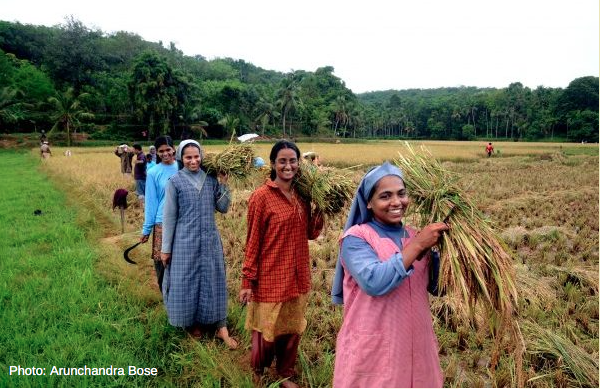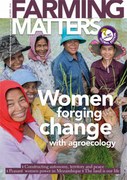In this interview, and four short videos, we asked four rural women leaders and activists from Asia and Africa about the role of women in agroecology. What we found were stories of race, caste, patriarchal systems, land grabbing, statelessness and, as an overriding theme, the lack of land ownership for women. These women are part of a larger coalition working to build rural women’s leadership. They believe that women organising amongst themselves to gain leadership skills and confidence is the first step to improving their livelihoods and fighting for their rights to land- so fundamental to agroecology.
Why is agroecology especially important for women?
Saro: Women in Asia are, in most cases, the farmers. But more than that, they are concerned about the nutrition of their families. There are actually more women interested in the models of agriculture that support diversity and nutrition. There are many cases of women who are fighting for land, particularly farmers. Once they get the land, they move to agroecology. So that’s why land struggles are central in our agroecology movements in for example the Philippines and India.
How do women’s struggles for land relate to agroecology?
Saro: Getting land is really the priority for peasant women’s movements right now. We have a campaign called ‘No land, No Life’. In the last few decades women have organised themselves to call for land titles in their name, or joint titles in both their and their partners’ names. Often it is easier for the women to control the production on the ground when the land belongs to them. Once they get the land, they want to make use of it in the most profitable way. Experience shows that if they go back to the industrial agriculture they actually can’t survive—the costs of the inputs are too high. So they choose agroecology. As they realise that they cannot do this type of agriculture alone, they have also moved towards collective ownership and collective farming.
What is the situation of female plantation workers?
Loges: Tamil plantation workers in Sri Lanka are among the most oppressed groups in the world. Under British rule there was a big caste problem. Tamil people were slaves in Sri Lanka, because Sri Lankan people didn’t want to work as labourers. Until as recent as 2004, Tamil people were stateless; they had no rights to own land. Women workers do most of the tea plucking on the plantations and they are get a very small wage. But when they have their own land, they can cultivate whatever vegetables they choose and maybe sell them. They need to work hard on their plot for a little bit of money. But it strengthens them. It means they have some money to do something, to educate their children, for example. Only when women have land do they gain leverage in their struggles for other rights; it provides some kind of empowerment. Having land also means they can save their children from pesticides, because the pesticide levels are high in the tea plantations. So the right to land is connected to the right to life.
What is the attitude of your government?
Gracie: Let me tell you a recent story from the Dalit women in India, another very marginalised group. We have been fighting with the government for 6 or 7 years, continuously struggling to get land titles. After the women finally got the land, the agricultural development officer gave them false titles. A government officer told them: “If you want the real titles, I want one of your woman for sex”. But our women, together, told him: “Okay, come to our village and we will give you one woman.” When the officer came to their village, very interested, he chose one woman. He went inside a room to wait for her, and closed the door. All the women together took their brooms and went in and beat the officer. He was so surprised that he ran away yelling: “Please, sorry, don’t beat me, I am very sorry, if you let me get away I will give you the real titles!” And after only two or three days he gave them the true titles. This was great. But the land they got was very hilly, full of stones and difficult to work. The women decided that by working together they got land, so by working together they would also clear it. Now they are cultivating the land together, using agroecology, making compost and earning some money.
What actions can support women in agroecology?
Maimouna: We need to strengthen the women’s movement. In Senegal, for example, we have only one network of female farmers. Our challenge is now to make alliances and expand this network across Senegal and to other countries in region. We need to do more advocacy work with our local government and authorities for women farmers to have access to land. We must help women who do have land to learn about other ways to manage pests. Pesticides are so harmful to women, their children and their land, and agroecology offers them a way out of this devastating cycle.
Saro: We need to have more campaigns, more documentation of successes and struggles. We need more people to support the assertion of our rights over land; to know that this is very important. This is our life. Without land we don’t have production, we don’t have a livelihood. We need land to survive and to use our skills in agroecological production.
Has the situation improved for women in Asia and Africa over the last 10 years?
Saro: A lot more organising is taking place among women. They know the land is their life and if they lose that, they lose everything. A lot of local groups have made it a point to raise awareness and work on capacity building, and women are more open to the idea of fighting for their rights. The communities that are now threatened by land grabbing, for example, saw how other communities lost their land due to the expansion of oil plantations in the 80s ad 90s. So they say “okay we need to organise ourselves” and they ask civil society organisations and community based organisations to support them.
Gracie: Before, only men were recognised as farmers in the communities, but now women are also seen as farmers. Before, the government did not allow women farmers to have land. But now they are working with officials to get land titles in their names and to register their land for agriculture cooperatives. That is a very big improvement.
Maimouna: Ten years ago in Senegal we didn’t have rural women represented in parliament and other councils. But now a women farmer leader was selected to be on the national economic and environmental council. She is the president of a national network of rural farmers and that is a real change for rural women in Senegal.
Loges: In Sri Lanka 10 years ago, they did not talk about plantation issues in national platforms, much less about women. Now they are, and as organised groups we speak about our problems in many platforms. This means others recognise us and our issues. We work with farmers and simultaneously, we work with the political parties. The truth is: wherever the space, as women we need to go and fight for our rights.
Interview: Jessica Milgroom


